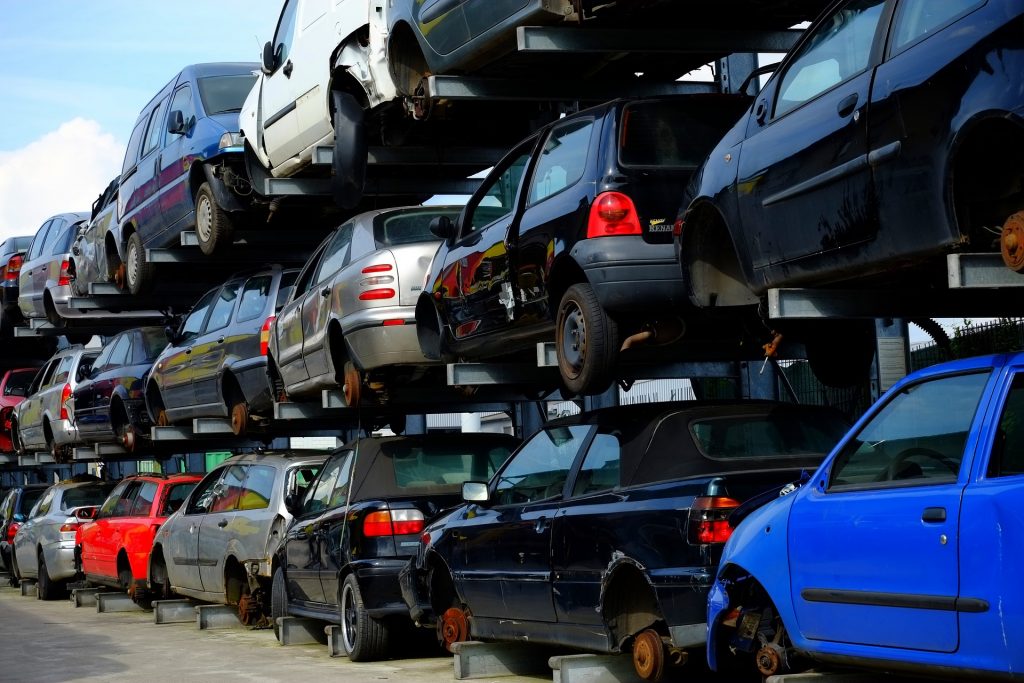
Cars are complex machines. When you see a classy Mercedes or an iconic Mini cruising the streets, it’s easy to admire the aesthetically pleasing exterior while forgetting that under the bonnet, there are hundreds of components working in tandem to keep the engine running. Motor vehicles are indeed the sum of their masterfully engineered parts.
However, this fact is never overlooked by Scrap Cars For Cash, or our UK-wide network of expert scrap and salvage buyers who know just what they’re looking at when a car is carried into their yard, no matter what state it’s in.
What is Scrap?
The term ‘scrap’ is extremely generalised. Scrapbooks or scrap paper might be the first thing that comes to mind, but we’re thinking bigger here. In the context of cars, ‘scrap’ refers to any vehicle that is no longer deemed roadworthy and should be disposed of – in its entirety – in such a way that the metal and glass can be recycled and put to use in other ways.
There’s no promise that your scrap car will be reused in a way that’s even remotely close to its original purpose, because it will actually be crushed down into blocks of metal and glass fragments separately. This allows the buyer to sell the newly acquired materials to various other industries, saving them from being wasted.
What is Salvage?
Did you know that the circle of life applies to the mechanical kingdom, too. If you sell your car as salvage, rather than scrap, it will be assessed to determine which of its parts can be used to bring other cars back to life. Salvage cars are put into categories in the same way as insurance write-offs (A – Scrap, B – Break, S – Structural & N – Non-structural) to evaluate their potential to be a donor for other vehicles.
Unfortunately, category A cars in fact aren’t salvageable and should be scrapped instead. B cars can have parts removed, but the outer shell of the car should be crushed once anything of use has been extracted. These parts can then be saved from the crusher and sold to drivers looking for a cheaper replacement for their own problem car.
Categories S and N mark the biggest difference from scrap cars, though. Cars in these categories are considered repairable and may end up back on the road in a completely legal manner.
Will I Get More Money For Selling My Car as Scrap or Salvage?
This is tricky to answer, because it depends on several factors. The current market value of the car, itself influenced by its age and condition, will impact the price you’re offered regardless of the expected fate of the car, but the make, mileage and rarity of your car can affect the offer you’ll receive if you plan to sell it on as salvage.
If the vehicle is still fitted with in-tact parts that are in tip-top condition and hard to come by, you might be pleasantly surprised by the price you’re quoted. You’ll also get more if your car falls into categories S or N, because the car has the potential to be revived and sold again to another driver. However, the buyer will have to take into account the cost of the repairs and the fact that salvaged cars are not viewed with the highest regard by customers browsing the forecourts.
Scrap Cars For Cash work with buyers who can assess the best course of action when dealing with any car, ensuring your profit is maximised and your old vehicle is dealt with in the most efficient way possible.
Which is Better For the Environment?
Scrap yards get a bad reputation for being unpleasant places thanks to their less-than-appealing look. Of course, nobody will try and argue that a scrapheap is easier on the eye than a Cornish beach or the Scottish highlands, but they actually have a much less significant impact on the environment than some might expect.
Authorised Treatment Facilities (ATFs), to give scrap yards their proper name, are required by law to recycle 95% of the materials from every car that they process. So, even if your car is crushed down into compact blocks of metal, almost all of it is legally required to be put to good use again in one way or another. And while the bulk of the vehicle will be metal, the recycling doesn’t end there. The fabric and glass will be removed and reused, with the latter being turned into sand, plus even the oil is removed and reused elsewhere to avoid letting it pollute the natural world once it’s removed from the car.
Salvaging a car is also good for the environment, in a slightly different but more obvious way. Cat S or N cars will end up back on the road as though nothing happened, but even Cat B cars will have their parts reused in other vehicles. Their components may not be dismantled and rebuilt as something new from scratch, but they are instead saving a different car from being destroyed and in turn, saving that 5% that may not be recycled from ending up at a landfill.
Here at Scrap Cars For Cash, we only work with licensed ATFs and their qualified members of staff, so you can rest assured that, whether your car is sold as scrap or salvage, it’s going to be given a new life in many different forms.
If your car is at the end of its life and needs to be scrapped, or if it’s ready to help breath new life into other vehicles, call Scrap Cars For Cash on 08443 761 020 or visit our website to receive an instant quote and find out how much you could get for selling it. Our collector will pick it up for free at no extra cost from anywhere in the country and you’ll have money in your bank in lightning-quick time.